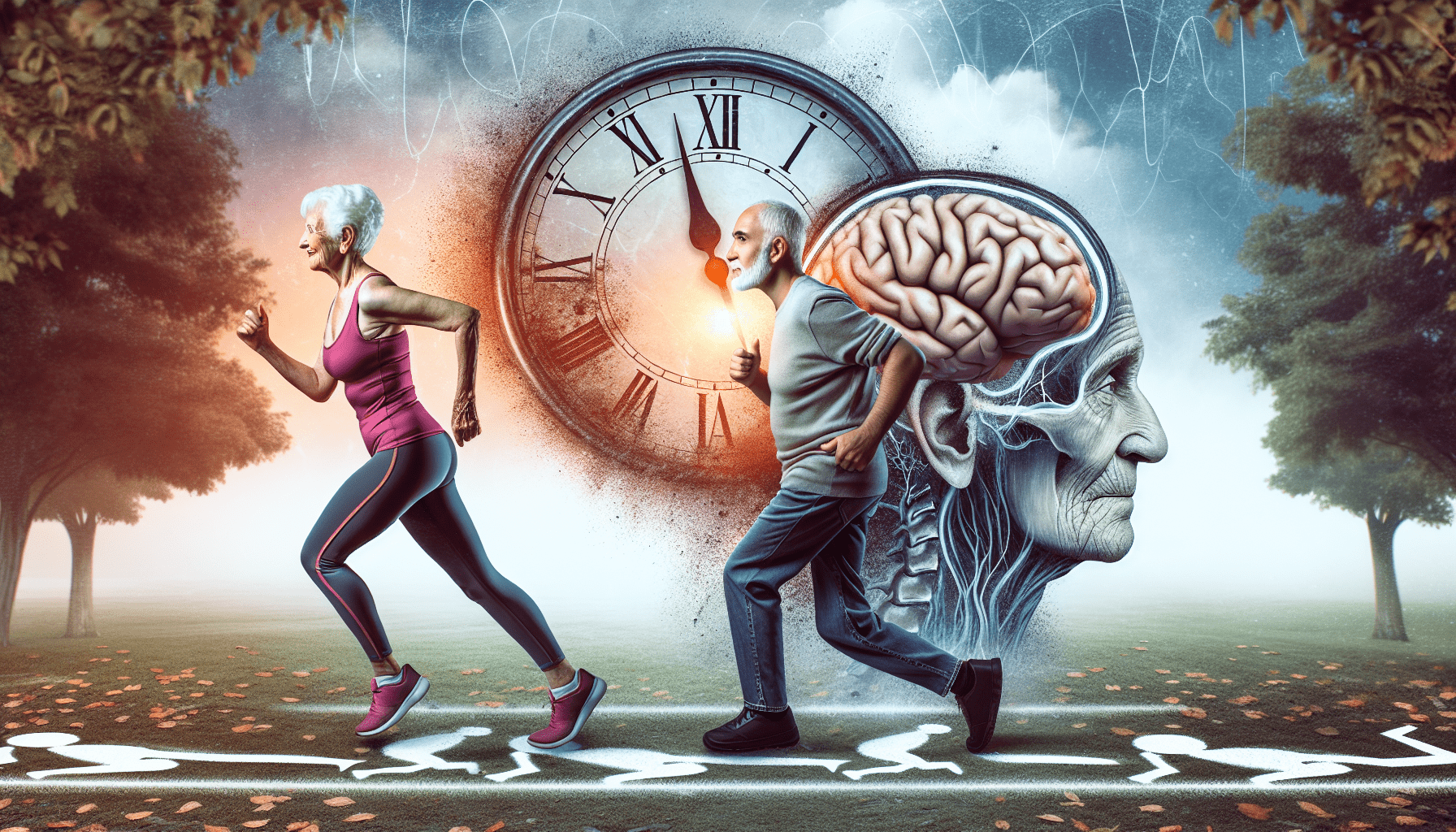Ever wondered how exercise can positively impact your memory as you age? In this article, we'll explore the fascinating connection between exercise and age-related memory decline. Rather than delving into general background information, we'll focus on providing you with in-depth coverage of this specific subject. So, if you're curious about the role exercise plays in preventing memory decline, you're in the right place! Let's dive in and uncover the exciting findings together.
Definition of Age-Related Memory Decline
Age-related memory decline refers to the natural cognitive changes that occur as we grow older, leading to difficulties in memory storage, retrieval, and overall cognitive functioning. It is a normal part of the aging process and affects almost everyone to some extent. While age-related memory decline is common, it is important to differentiate it from more serious conditions like Alzheimer's disease and dementia, which are characterized by more severe and progressive memory impairment.
Understanding Memory Decline
Memory decline is a natural part of the aging process and is influenced by various factors such as genetics and lifestyle choices. As we age, the brain undergoes certain changes that affect our memory and cognitive abilities. Understanding these changes can help us better comprehend the impact of aging on memory function and develop strategies to mitigate memory decline.
Aging and Cognitive Abilities
As we age, various cognitive abilities, including memory, may start to decline. This can manifest in difficulties with recall, slower information processing, and reduced overall cognitive efficiency. However, it is important to note that not all aspects of memory are affected equally. Different types of memory, such as short-term and long-term memory, may be impacted to varying degrees.
Differentiating Age-Related Memory Decline from Diseases like Alzheimer's and Dementia
While age-related memory decline is a normal aspect of aging, it is crucial to recognize the distinction between this decline and more serious neurodegenerative conditions like Alzheimer's disease and dementia. Age-related memory decline is milder in nature, and individuals experiencing it can still generally maintain their daily functioning. On the other hand, Alzheimer's and dementia involve more severe memory impairment and can significantly impact one's ability to carry out everyday tasks independently.
The Science Behind Memory
Human memory is a complex cognitive process that involves encoding, storage, and retrieval of information. Encoding refers to the initial process of transforming sensory information into a form that can be stored in the brain. Storage involves the retention of information over time, while retrieval is the ability to access and recall stored information when needed.
How Age Affects Memory Storage and Retrieval
As we age, memory storage and retrieval processes can become less efficient. The brain's ability to encode new information may decline, leading to difficulties in forming new memories. Additionally, retrieval of stored information may become slower and less accurate. These age-related changes in memory function can be influenced by factors such as reduced blood flow to the brain, alterations in neurotransmitter levels, and structural changes in key brain regions involved in memory processing.
Brain Structures Involved in Memory Processing
Several brain structures play crucial roles in memory processing. The hippocampus, located deep within the brain, is responsible for forming and consolidating new memories. The frontal cortex, involved in higher-order cognitive functions, plays a role in working memory and the ability to hold and manipulate information in the mind. The amygdala, another important brain structure, is involved in the emotional aspects of memory and can influence memory formation and retrieval.
Neural Loss with Advancing Age
As we age, there is a natural loss of neurons and synapses in the brain. This neural loss can impact memory function and other cognitive processes. The volume of brain structures that are important for memory, such as the hippocampus and frontal cortex, may also decrease with age. This neural loss and structural changes can contribute to memory decline and other cognitive changes observed in older adults.

Impact on Neurotransmitters
Neurotransmitters are chemical messengers in the brain that play a vital role in communication between neurons. With advancing age, there may be changes in the levels and functioning of neurotransmitters, which can have a direct impact on memory and cognitive abilities. For example, lower levels of acetylcholine, a neurotransmitter involved in learning and memory, have been associated with age-related memory decline.
Age-Related Changes in Brain Structures
Age-related changes in brain structures can significantly affect memory and cognitive abilities. Apart from neural loss, there may be alterations in the connectivity between different brain regions, leading to disruptions in memory processing. The frontal cortex, which is crucial for working memory, may show reduced activity and connectivity with other brain regions as we age. These structural changes can contribute to memory decline and cognitive deficits observed in older adults.
The Importance of Exercise for Cognitive Health
Exercise is not only beneficial for physical health but also plays a crucial role in maintaining cognitive health, including memory function, especially in older adults. Regular physical activity has been found to positively impact brain structures and enhance cognitive abilities. Incorporating exercise into your daily routine can have significant benefits for your memory and overall cognitive well-being.
Exercise and Brain Health
Engaging in regular exercise has been shown to improve brain health and function. Exercise increases blood flow to the brain, promoting the delivery of oxygen and nutrients that are essential for optimal brain function. It also stimulates the release of various growth factors that support the survival and growth of neurons, enhancing brain plasticity and cognitive abilities.
Impact of Physical Activity on Cognition
Physical activity has been linked to improvements in various cognitive functions, including memory, attention, and executive functions. Regular exercise can enhance information processing speed, improve working memory capacity, and boost overall cognitive performance. These cognitive benefits can be particularly significant in older adults, helping to counteract age-related memory decline and cognitive decline.
The Role of Exercise in Promoting Neuroplasticity
Neuroplasticity refers to the brain's ability to adapt and reorganize itself in response to experiences and environmental changes. Exercise has been shown to promote neuroplasticity by increasing the production of neurotrophic factors and stimulating the growth of new neurons and connections in the brain. This enhanced neuroplasticity can help offset age-related declines in memory and cognitive function.
Types of Exercise Beneficial for Cognitive Decline
Various forms of exercise can be beneficial for reducing age-related memory decline and improving cognitive function in older adults. Some types of exercise that have shown positive effects on cognition include aerobic exercises, resistance or strength training, balance and flexibility exercises, and mind-body exercises like yoga and tai chi.
Aerobic Exercises
Aerobic exercises, such as brisk walking, jogging, swimming, or cycling, increase heart rate and promote cardiovascular fitness. Regular aerobic exercise has been associated with improvements in memory, attention, and overall cognitive function. It can also enhance brain health by increasing blood flow to the brain and stimulating the release of neurotrophic factors.

Resistance or Strength Training
Resistance or strength training exercises involve working against a resistance to build muscle strength and endurance. These exercises, which can include weightlifting, resistance bands, or bodyweight exercises, have been found to have cognitive benefits. Strength training can enhance executive functions, working memory, and attention, contributing to overall cognitive health and memory improvement.
Balance and Flexibility Exercises
Balance and flexibility exercises, such as yoga or Tai Chi, focus on improving stability, coordination, and range of motion. While these exercises may not have direct effects on memory, they contribute to overall physical and mental well-being. The mind-body connection promoted by these exercises, accompanied by relaxation and stress reduction, can indirectly support memory function and cognitive health.
Mind-Body Exercises
Mind-body exercises like yoga and Tai Chi combine physical movements with mindful awareness and deep breathing. These exercises have been shown to reduce stress, improve mood, and enhance cognitive function, including memory. The relaxation response induced by mind-body exercises can have positive effects on memory encoding and retrieval, as well as overall well-being.
Evidence Linking Exercise to Improved Memory
Numerous research studies have demonstrated the positive effects of exercise on memory and cognitive function in older adults. Regular physical activity has been associated with improvements in various aspects of memory, from short-term memory to long-term memory consolidation. These memory enhancements have been observed across different age groups and populations, highlighting the universal benefits of exercise for memory improvement.

Long-Term vs. Short-Term Effects of Exercise on Memory
Regular exercise has both long-term and short-term effects on memory. Long-term exercise regimens have been shown to lead to structural and functional changes in the brain that can enhance memory capacity over time. Short-term effects of exercise, such as engaging in physical activity before learning or performing memory tasks, can also improve memory performance and enhance learning abilities.
Exercise Intensity and Memory Improvement
The intensity of exercise may play a role in memory improvement. Moderate-intensity aerobic exercises, which elevate heart rate and increase oxygen delivery to the brain, have been found to have the most beneficial effects on memory and cognition. However, even light-intensity exercise, such as walking, can still confer cognitive benefits and contribute to memory enhancement, especially when performed regularly.
Exercise, Stress Reduction, and Memory
Stress can have a detrimental effect on memory, impairing both encoding and retrieval processes. Exercise, however, acts as a natural stress buster. Physical activity stimulates the release of endorphins, reduces stress hormones like cortisol, and promotes relaxation. By reducing stress levels, exercise can positively impact memory function and enhance cognitive performance.
Exercise-Induced Mood Enhancement and Its Role in Memory Enhancement
In addition to reducing stress, exercise has been found to improve mood and overall well-being. The release of endorphins during exercise creates a sense of euphoria and positivity, known as the “runner's high.” This mood enhancement can have a direct impact on memory by improving cognitive processes like attention, motivation, and emotional regulation, all of which contribute to memory formation and retrieval.
Barriers and Challenges to Regular Exercise
There are common barriers and challenges that older adults may face when trying to engage in regular exercise. These can include physical limitations, lack of motivation, time constraints, and fear of injury. Identifying these obstacles is crucial in finding strategies to overcome them and promote a more active lifestyle among aging individuals.
Ways to Overcome Barriers
There are various strategies that can help older adults overcome barriers to regular exercise. Working with a healthcare professional or a qualified exercise specialist can provide guidance and personalized exercise programs tailored to individual needs and abilities. Setting realistic goals, finding enjoyable activities, and incorporating exercise into daily routines are other effective approaches to overcoming barriers and making exercise a regular habit.
Promoting an Active Lifestyle Among Aging Individuals
Promoting an active lifestyle among aging individuals requires a multi-faceted approach. It involves raising awareness about the benefits of exercise on memory and cognitive health, providing accessible and age-appropriate exercise options, and creating supportive environments that encourage physical activity. Community-based programs, social support networks, and public health initiatives can all play a role in promoting an active lifestyle among older adults and fostering better cognitive health.
Preventing Age-Related Memory Decline Through Lifestyle Modifications
In addition to exercise, lifestyle modifications can further mitigate age-related memory decline and promote overall cognitive health.
Balancing Exercise with Healthy Diet
Maintaining a healthy diet that supports brain health is essential for preventing age-related memory decline. A diet rich in fruits, vegetables, whole grains, lean proteins, and healthy fats provides the necessary nutrients and antioxidants to support optimal brain function. Including foods like fatty fish, berries, nuts, and seeds, which are high in omega-3 fatty acids and antioxidants, can have specific benefits for memory and cognitive health.
Importance of Social Engagement
Social engagement has been linked to better cognitive function and a reduced risk of cognitive decline. Regular social interactions, whether through activities with friends and family or participation in community groups, stimulate the brain, promote mental stimulation, and reduce feelings of loneliness and isolation. Maintaining social connections can have a positive impact on overall cognitive health and memory function.
Impact of Intellectual Stimulation
Engaging in intellectually stimulating activities can help maintain cognitive function and prevent memory decline. Activities such as reading, puzzles, learning new skills, or engaging in hobbies that require critical thinking and problem-solving can keep the brain active and challenged. Intellectual stimulation promotes neural connections, enhances cognitive flexibility, and supports memory function throughout the aging process.
Limitations and Future Directions of Research
While there is substantial evidence supporting the positive effects of exercise on memory and cognitive health, there are still limitations in understanding the exercise-memory link. Many studies have focused on short-term effects, and long-term studies evaluating the sustained benefits of exercise are needed. Further research is also required to identify optimal exercise regimens, duration, and intensity for different age groups and individuals with varying levels of memory decline.
Potential Areas for Future Research
Future research could explore potential underlying mechanisms that link exercise to improved memory, such as changes in neuroplasticity, neurotransmitter levels, or inflammation. Additionally, studies focusing on specific populations, such as individuals at high risk for age-related memory decline or those with mild cognitive impairment, could provide valuable insights into targeted exercise interventions. Further investigations into the combined effects of exercise with other cognitive interventions, such as cognitive training or brain stimulation, may also be promising.
Alternative Strategies to Enhance Cognitive Health
While exercise is a powerful tool for preventing age-related memory decline, there are other strategies that can also support cognitive health. These can include engaging in mentally stimulating activities, maintaining a healthy diet, getting quality sleep, managing stress, and staying socially active. A holistic approach that combines multiple lifestyle modifications may provide the most comprehensive support for cognitive health and memory function.
In conclusion, exercise plays a crucial role in preventing age-related memory decline. Regular physical activity enhances brain health, supports memory function, and promotes overall cognitive well-being. By understanding the science behind memory, the effects of aging on the brain, and the evidence linking exercise to improved memory, individuals can make informed choices to incorporate exercise into their daily lives. Overcoming barriers to exercise, promoting an active lifestyle, and adopting other lifestyle modifications can further enhance cognitive health and contribute to successful aging with a sharper, more vibrant memory.



